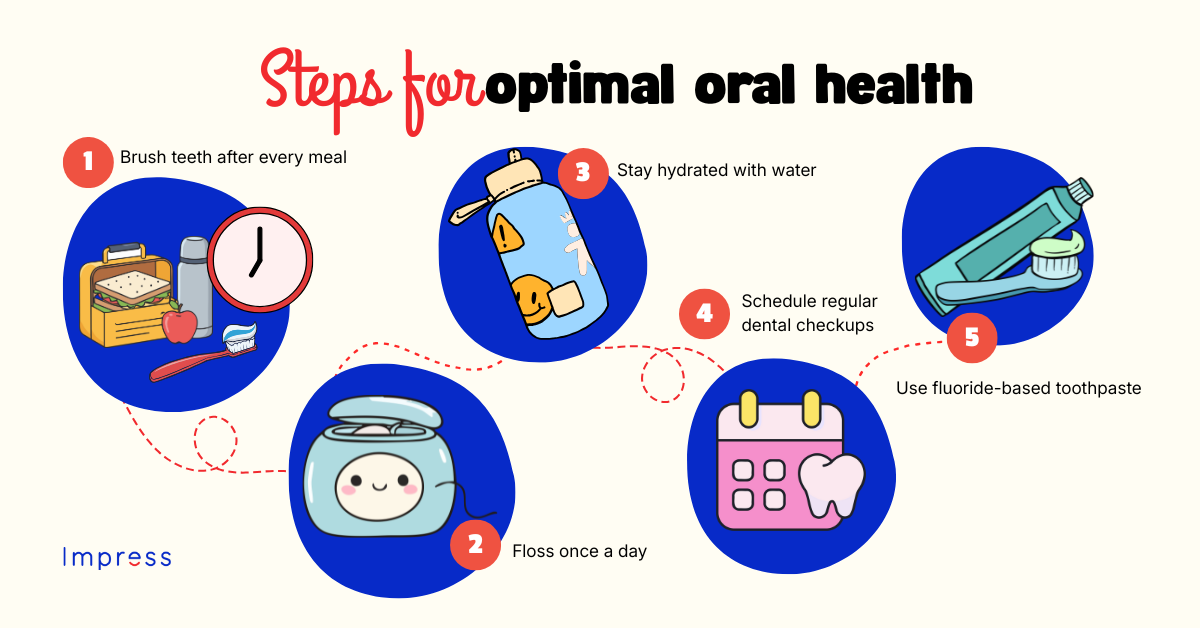7 questions and oral hygiene tips
If you get carried away over the holidays or fall ill and neglect your oral care routine as a result, but you’re keen to get back to it, then this article is for you. We'll show you how to take care of your teeth, improve your oral health, and establish the best dental hygiene routine after a disrupted routine.
Oral hygiene tips for a optimal oral health
According to a survey conducted by Impress, 35% of UK patients are dissatisfied with their oral health. This figure is higher in the UK than in other countries where Impress is present. So how can we improve our oral health?
Below, we explore a number of ways to resume or improve your oral health routine and better look after your teeth.

1. Should you brush your teeth after each meal?
Even though it seems obvious, it never hurts to remind ourselves: brushing teeth is the foundation of a good oral care routine.
If, over the break, it was difficult to brush teeth regularly, it's important to go back to brushing after every meal upon your return to work or studies.
When it comes to the little ones, it is essential to instil a brushing routine from the time they start to teethe and cut their first tooth. Familiarising them with the toothbrush avoids oral health problems in the future and guarantees the best dental hygiene routine from the start.
2. How often should you floss?
Dental floss is the perfect complement to brushing your teeth, and you should do it once a day. It is an effective solution for properly cleaning between your teeth and those tight spaces, in order to remove food debris and bacterial plaque.
In our tips for maintaining good oral health in the summer, we recommend dedicating one day a week to intensive dental care, but when returning to the routine, we suggest using floss daily for the best oral hygiene results throughout the year.
3. What does a water flosser do?
Incorporating a water flosser into your dental hygiene routine helps to remove the food debris, plaque and bacteria in your mouth more effectively than simply brushing and flossing.
It helps clean dental crowns, orthodontic appliances, bridges or implants, and reduces bleeding, gum inflammation, as well as bad breath.

4. Healthy eating habits
Let’s be honest, over the holidays, or when we're hit with a seasonal flu, both adults and children alike neglect their diet. People may eat out of their usual mealtimes, eat more snack-like or comfort foods, and have sugary drinks which all compromises our oral health.
Below are some foods that can help bring back balance:
- Foods rich in fluoride (meat, fish, spinach, onions and lettuce) improve the strength of the tooth enamel and prevent tooth decay.
- Dairy products, such as milk, yoghurt and cheese, are also non-cariogenic foods and help to keep teeth strong and healthy.
- Eggs, fish, lean meat and vitamin C help to improve our gums.
- Raw vegetables and fresh fruit help to maintain the brightness of our teeth.
5. Stay hydrated
During warmer periods of the year and when dealing with sickness, it's important to stay hydrated. We have a tendency to opt for fizzy or sugary drinks as an alternative to water. In order to keep teeth healthy, it is important to consume water.
Keeping the mouth hydrated is essential to avoid dry mouth, strengthen the teeth, clean the mouth and combat bad breath. It is recommended that you drink 2-3 litres of water a day for good oral health.
6. The perfect time to visit the dentist
After returning from the holidays, having neglected your oral care routine a little, it is important to schedule a visit to the dentist for a check-up.
During the check-up, the dentist will carry out an oral health examination to assess the condition of the teeth.
They will let you know if any other treatment is needed, like a dental cleaning, dental curettage or other intervention.
7. Problems with your teeth during pregnancy
Pregnancy may require additional visits to the dentist as hormones can cause sensitivity and bleeding of the gums.
To prevent damage, teeth breaking or caries whilst you're pregnant, keep in touch with your dentist to schedule an appointment during your pregnancy and be sure to check out any changes or pain in your teeth, jaw or gums immediately.

Keep your teeth healthy and aligned with Impress
Maintaining good oral health can involve orthodontic treatment, which allows us to correct the position of teeth and improve the bite.
At Impress, we offer treatments with clear aligners that, being removable, enable you to keep up with your dental hygiene routine as if you were not wearing them.
If you are interested in starting an orthodontic treatment with us, visit your nearest Impress clinic or get in touch by booking an appointment online, by phone, or via WhatsApp.
FAQ's about oral hygiene
How long should I brush my teeth for?
Teeth should be brushed for two minutes, twice a day at a minimum.
What type of floss is best?
It all depends on your needs! Waxed floss is great for people with small gaps between their teeth, while floss picks and water flossers can be great if people struggle with dexterity.
Does chewing gum help your teeth?
Yes, chewing sugar-free gum can help your teeth by hydrating them, as chewing gum helps to increase saliva production.




